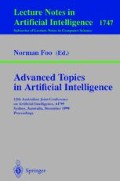Abstract
The rules of inductive inference are formalized using a transition rules. The rejection of a consequence obtained by inductive inference is formalized by a revision rule. An inductive process is defined as a sequence of versions of a theory generated by alternatively applying the inductive inference rules and the revision rule. An inductive procedure scheme is constructed. It takes a sequence ɛ M of instances of a given model M and a given formal theory Γ as its inputs, and generates the inductive processes. It is proved that if ɛ M contains all instances of the model M, then every inductive sequence generated by the procedure scheme is convergent. Its limit is the set of all true statements of the model M.
Access this chapter
Tax calculation will be finalised at checkout
Purchases are for personal use only
Preview
Unable to display preview. Download preview PDF.
References
Mo, S., Some thoughts on Inductive Inference, The supplement of Logic, Studies of Philosophy, (in Chinese), 1993.
McKeon, R., The Basic Works of Aristotle, Random House, New York, 1941, pp 198.
Plotkin, G., A structural approach to operational semantics, Lecture notes, Aarhus University, Denmark, September, 1981.
Li, W., An Open Logic System, Science in China, Series A, Vol.36, No.3, March, 1993.
Alchourrón, C.E., Gärdenfors, R. and Makinson, D., On the logic of theory change: partial meet contraction and revision functions, The Journal of Symbolic Logic, Vol.50, No.2, June, 1985.
Flew, A., A Dictionary of Philosophy, Pan Books Ltd, 1979.
Gallier, J.H., Logic for Computer Science, foundations of automatic theorem proving. John Wiley & Sons, 1987, 147–158, 162–163, 197–217.
C.C Chang & H.J. Keisler, Model Theory, North-Holland, 1990.
Hume, D., Theory of knowledge,” An Enquiry Concerning Human Understanding, University of Texas Press, Austin, 1953.
Li, W., A logical framework for evolution of specifications, Programming Languages and Systems, (ESOP’94), LNCS 788, Sringer-Verlag, 1994.
Paulson, L., Logic and Computations, Cambridge University Press, 1987, 38–50.
Author information
Authors and Affiliations
Editor information
Editors and Affiliations
Rights and permissions
Copyright information
© 1999 Springer-Verlag Berlin Heidelberg
About this paper
Cite this paper
Li, W. (1999). A Logical Framework for Inductive Inference and Its Rationality. In: Foo, N. (eds) Advanced Topics in Artificial Intelligence. AI 1999. Lecture Notes in Computer Science(), vol 1747. Springer, Berlin, Heidelberg. https://doi.org/10.1007/3-540-46695-9_26
Download citation
DOI: https://doi.org/10.1007/3-540-46695-9_26
Publisher Name: Springer, Berlin, Heidelberg
Print ISBN: 978-3-540-66822-0
Online ISBN: 978-3-540-46695-6
eBook Packages: Springer Book Archive

